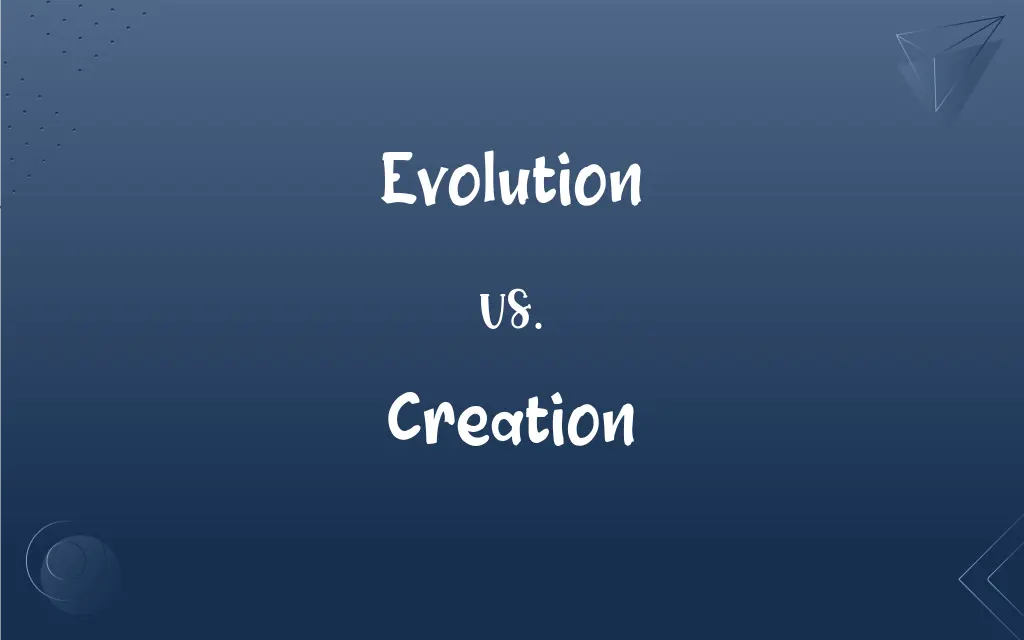Evolution vs. Creation: What's the Difference?
Edited by Aimie Carlson || By Janet White || Published on March 5, 2024
Evolution is a scientific theory explaining the gradual development of life through natural processes, while creation refers to the belief that life and the universe were created by a divine or supernatural being.

Key Differences
Evolution is a scientific concept that explains the gradual development and diversification of life on Earth through natural processes such as mutation, natural selection, and genetic drift. Creation, on the other hand, is a religious or philosophical belief that life, the Earth, and the universe were created by a divine or supernatural entity.
The theory of evolution is supported by a vast body of evidence from various scientific fields, including biology, paleontology, and genetics. Creationism, in contrast, is based on religious texts and beliefs, and it does not rely on empirical scientific evidence.
Evolutionary theory does not address the origin of life itself but rather the processes by which life has changed and diversified over time. Creationism often includes specific beliefs about the origin of life, the age of the Earth, and the process by which living organisms were created.
In the context of evolution, the diversity of life is explained by natural mechanisms that operate without the need for a guiding intelligence. In creationist views, the complexity and diversity of life are attributed to the intentional design of a creator.
The debate between evolution and creation is not just scientific but also cultural and philosophical, often reflecting broader discussions about the nature of science, religion, and the origins of life and the universe.
ADVERTISEMENT
Comparison Chart
Basis
Scientific theory
Religious or philosophical belief
Evidence
Supported by empirical scientific evidence
Based on religious texts and beliefs
Process
Natural processes like mutation and natural selection
Divine or supernatural act
Explanation
Explains the diversity of life through natural mechanisms
Attributes complexity and diversity to a creator
Origin of Life
Does not specifically address the origin of life
Often includes beliefs about the origin of life
ADVERTISEMENT
Evolution and Creation Definitions
Evolution
Evolution is the process by which species of organisms change over time through genetic variation and natural selection.
The evolution of the horse can be traced through fossil records showing gradual changes in size and hoof structure.
Creation
Creation is the belief that the universe and life were brought into existence by a divine or supernatural being.
In many religious traditions, creation stories explain the origins of the world and humanity.
Evolution
Evolutionary theory explains the diversity of life on Earth as a result of adaptation to different environments.
The evolution of finches on the Galápagos Islands is a classic example of adaptive radiation.
Creation
Creationism is a worldview that rejects evolutionary explanations and asserts that life was created in its current form.
Young Earth creationists believe that the Earth was created a few thousand years ago.
Evolution
Evolutionary biology is the study of the origins, changes, and relationships among species over time.
The discovery of DNA provided a molecular basis for understanding evolution.
Creation
Creation can be used to describe the formation or establishment of something, such as an organization or system.
The creation of the United Nations was a response to the need for global cooperation after World War II.
Evolution
Evolution occurs through mechanisms such as mutation, gene flow, genetic drift, and natural selection.
Antibiotic resistance in bacteria is an example of evolution through natural selection.
Creation
Creation can also refer to the act of producing or bringing something new into existence.
The creation of a new vaccine requires years of research and testing.
Evolution
Evolution is a central concept in biology that unifies different areas of the life sciences.
The theory of evolution provides a framework for understanding the similarities and differences among living organisms.
Creation
In the arts, creation refers to the process of generating original ideas and works.
The creation of a masterpiece involves talent, skill, and creativity.
Evolution
A gradual process in which something changes into a different and usually more complex or better form.
Creation
The act of creating.
Evolution
A result of this process; a development
Judo is an evolution of an earlier martial art.
Creation
The fact or state of having been created.
FAQs
Can individuals evolve?
No, individuals do not evolve. Evolution is a process that affects populations over many generations.
What is evolution?
Evolution is the process through which species of organisms change over time through variations in their genetic material, leading to the emergence of new species.
How does sexual selection affect evolution?
Sexual selection, a form of natural selection, influences evolution by favoring traits that enhance an individual's chances of mating and reproducing.
How does evolution occur?
Evolution occurs through mechanisms like natural selection, genetic drift, mutations, and gene flow, leading to changes in the traits of populations over generations.
What is speciation?
Speciation is the process by which new, distinct species evolve from existing species.
What role do mutations play in evolution?
Mutations introduce genetic variation, which is essential for evolution, as they can result in new traits that may be advantageous, neutral, or detrimental.
What are creation myths?
Creation myths are symbolic narratives about how the world and life began. Nearly every culture has its own creation myth, which reflects its beliefs and values.
What evidence supports the theory of evolution?
Evidence includes fossil records, genetic similarities among species, observed evolutionary changes in species, and geographical distribution of organisms.
Who proposed the theory of natural selection?
Charles Darwin and Alfred Russel Wallace independently proposed the theory of natural selection.
What is a common misconception about evolution?
A common misconception is that evolution is a linear progression towards complexity or "perfection." In reality, evolution is about adaptations that suit specific environments.
Is evolution a theory or a fact?
Evolution is both a fact and a theory; the fact is that organisms have changed over time, and the theory explains the mechanisms of these changes.
What is creation?
Creation generally refers to the belief that the universe and life originated from specific acts of divine creation, as opposed to the scientific explanation of natural processes like evolution.
Can one believe in both evolution and creation?
Yes, some people integrate their religious beliefs with scientific understanding, seeing evolution as a tool used by a divine power to bring about life in its present form.
What is theistic evolution?
Theistic evolution is the belief that God initiates and directs the process of evolution, harmonizing religious beliefs with scientific explanations of life's development.
Are there different types of creationism?
Yes, there are various forms, including young Earth creationism, which takes a literal interpretation of religious texts, and old Earth creationism, which accepts some scientific conclusions about Earth's age.
What is the significance of creation stories in cultures?
Creation stories provide insights into how ancient societies understood the world around them, their place in it, and the values and beliefs of their culture.
How do creation beliefs impact society?
Creation beliefs can significantly influence cultural, educational, and scientific discussions, often affecting how topics like biology and cosmology are taught and understood.
How does creationism differ from the theory of evolution?
Creationism is based on religious beliefs that life, Earth, and the universe were created by a supernatural deity, while evolution is a scientific explanation based on natural processes.
What is "creation science"?
Creation science attempts to provide scientific backing for the literal interpretations of religious texts regarding the origin of the world and life, often challenging scientific consensus on these topics.
What is intelligent design?
Intelligent design is a view that certain features of the universe and living things are best explained by an intelligent cause, not an undirected process such as natural selection.
About Author
Written by
Janet WhiteJanet White has been an esteemed writer and blogger for Difference Wiki. Holding a Master's degree in Science and Medical Journalism from the prestigious Boston University, she has consistently demonstrated her expertise and passion for her field. When she's not immersed in her work, Janet relishes her time exercising, delving into a good book, and cherishing moments with friends and family.
Edited by
Aimie CarlsonAimie Carlson, holding a master's degree in English literature, is a fervent English language enthusiast. She lends her writing talents to Difference Wiki, a prominent website that specializes in comparisons, offering readers insightful analyses that both captivate and inform.








































































